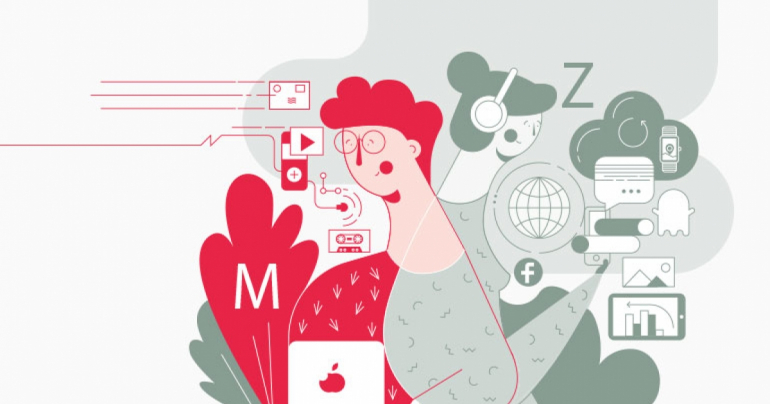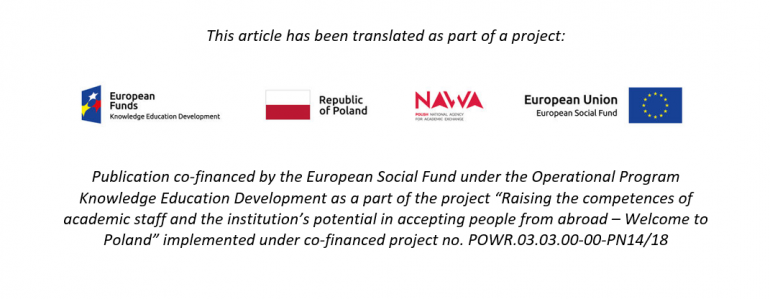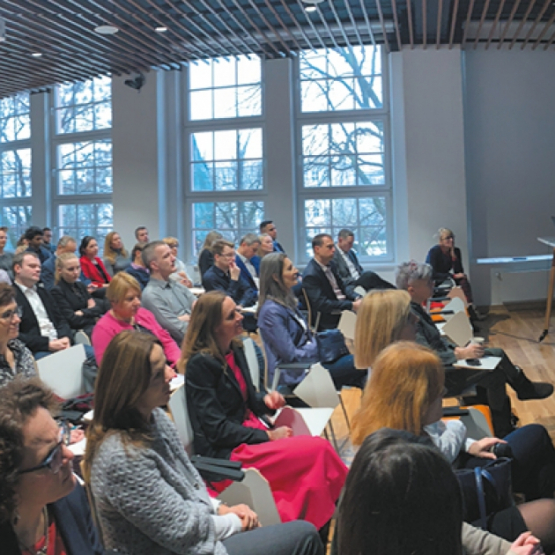
AFTER MILLENIALS, THERE APPEARS A GENERATION BORN IN THE DIGITAL WORLD
The Kombi band, better known to representatives of generations slightly older than those mentioned in the text, sang in a fairly popular song: ‘Each generation has its own time. Every generation wants to change the world. [...] Each generation has its own voice. Every generation wants to believe in something. ‘ In short, they expressed the truth observable both in life and in the results of research.
Numerous industry articles (HR, EB), most frequently define generation as a group of people linked by a common ‘generational experience’, featured by a certain system of values and worldview shaped by the socio-political context in which individuals grew up in their youth. The analysis suggests that they share some common attitudes and a hierarchy of values.
The unusually fast pace of contemporary changes (according to Moore's law, we can expect doubling of technological capabilities every 2 years) will affect both social changes and the needs, attitudes and expectations of individuals, and generations can follow each other much faster than we were used to.
And so, after Millennials we can observe another generation that occurs on the horizon of the analysis – it is the Z generation. It includes people born in the years 1997–2003 who are significantly different from the previous generation. If we accept the dates indicated above, then the representatives of the Z generation are already students of our university, and in the next few years they will probably constitute a significant number of students. It is therefore worth taking a closer look at them, recognising in particular attributes assigned to the group, which distinguish it from the group of Millennials as they also significantly affect the functioning of the university. The fact that this is happening is evidenced by both the direct experience of our unit in contacts with students and the cases known from the stories of other SGH departments or research and didactic fellows.
A brief summary of the characteristics of the Millennials and the Z generation* is presented on the next page. The nature of generational studies lies in the fact that they focus on capturing certain specific features, attitudes or values, which differentiates one generation from another. The knowledge of the indicated characteristics facilitates a better understanding and more effective communication with them. It is worth remembering that, despite the distinguishing features, there are still some similarities between individual generations. They will certainly help find a platform for agreement and joint action.
MILLENIALS
- Millennials are people born from around the beginning of the 1980s to around the mid or end of the 1990s (dates referred to in the studies: 1981–1996 or 1980–1995, or 1983–1999).
- They grew up in a world of relative economic stability, brought up by very (over) caring parents who tried to protect their children, appreciated them for their efforts, intensively engaged in their lives, often solving problems for them.
- During their lifetime, the Internet, social media, smartphones and other modern technologies developed rapidly, becoming something common.
- Highly focused on themselves, dependent, but at the same time they are creative idealists.
- They expect a good salary and a positive organisational culture, focused on teamwork, and a friendly atmosphere.
- Diversity, inclusion and flexibility in terms of time and place of work are important factors.
- They value work-life balance and they are not willing to devote their personal lives to work.
- They need support from their superiors, appreciation through ongoing feedback.
- They are not willing to take leadership roles.
- Relatively low loyalty, more and more often they make rapid decisions about change and have no problem with mobility in order to ensure better working conditions.
- Most of them recognise that the measure of enterprise success should go beyond financial results and expect business to do so.
Z GENERATION
- The Z Generation are people born in the years 1997–2003 (the years given are indicative).
- They grew up in times of economic turbulence and instability, with unprecedented tolerance, openness to otherness and diversity. Prepared by parents for dealing with or avoiding life difficulties.
- This generation of the so-called digital natives - doesn't know the world without the widespread use of modern technologies, they are extremely advanced in operating new devices, and the digital world, communication and contact with people through social media are natural for them, sometimes even easier than in real life.
- They have a highly developed self-awareness, independence, realism in looking at the world, having at the same time unique innovation and entrepreneurial spirit.
- They have constantly changing needs, it is difficult to gain their loyalty as a customer and employee, it is necessary to constantly and in advance look for new ways to reach them and earn their confidence. Very low loyalty.
- Ambitious, multidisciplinary, trying to combine various fields of knowledge into a new, innovative effect, constantly looking for new, better, faster, ‘cooler’ solutions.
- Even more focused on development perspectives, the need to be included to be part of the solution.
- Almost 2/3 of them would like to start their own business whereby they allow failure in the first attempts, treating it as a learning opportunity.
- Not only do they expect a responsible approach from business, but they also clearly see their role as part of a larger ecosystem and their own responsibility for changing the world for the better.
JUSTYNA KOZERA, the director of the Centre for Career and Relations with SGH Graduates
* The following reports constituted the source of the information presented in the table: EY, What if the next big disruptor isn't a what but a who? Gen Z is connected, informed and ready for business from 2016; Deloitte, Millennials 2018; PwC, University of Southern California and the London Business School, PwC’s NextGen: A global generational study. Evolving talent strategy to match the new workforce reality of 2013.




